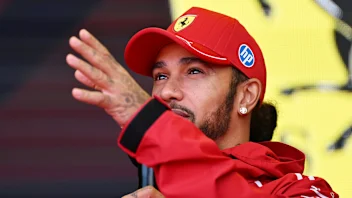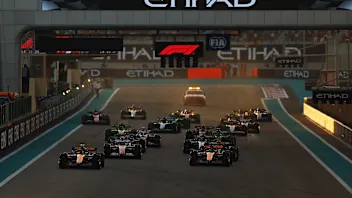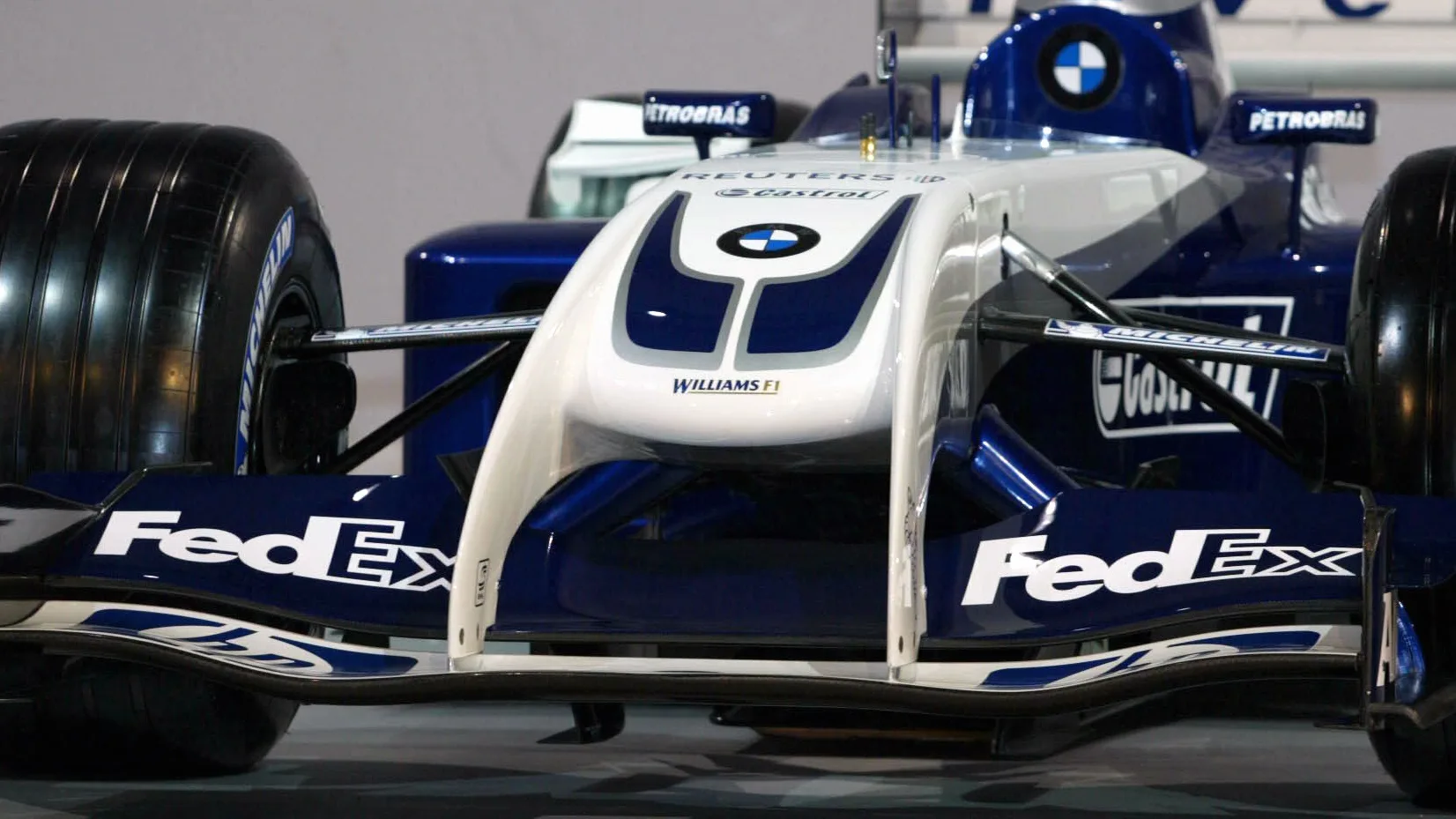This week will see Williams become the first team to launch their 2018 attack, kicking off a busy period of car unveilings. The question is, will we see any surprises when the covers come off? As the anticipation builds, we cast an eye over several launches from the recent past that set tongues wagging…
Williams debut the ‘walrus nose’, 2004
Whether you thought it resembled a sabre-toothed tiger, a hammerhead shark, or - as most did - a walrus baring its tusks, it’s safe to say there was barely a mouth that wasn’t gaping as Williams presented their latest challenger - and its highly unusual nose - at Valencia in Spain in January 2004. "I don't think it's very pretty but I shall certainly fall in love with it if it's a winner," quipped team boss Frank Williams, but despite his team’s early promise in winter testing, this somewhat ugly duckling never quite blossomed into a beautiful swan. The radical nose job had been designed to improve airflow over and below the car, but it wasn’t until the final race of the season in Brazil, six races after Williams had ditched the novel solution in favour of a more conventional design, that they ended up scoring their one and only victory of the season.
Honda unveil unique ‘Earth car’ livery, 2007
Honda had forewarned fans that their 2007 colour scheme would be ‘very different’ and they’d even hinted at an environmental theme, but that didn’t prevent jaws dropping when the team finally revealed their new ‘Earth car’ livery to the world. Covered from end to end with a satellite picture of the surface of the globe as seen from space, and featuring virtually no branding, the car represented a radical break in convention, as well as being the focal point for a noble campaign to raise awareness of environmental issues. But while some were impressed by the level of detail expressed in the graphics, others uncharitably compared the new paintjob to pondwater. Well, you can’t please all the people all of the time, can you?
McLaren present radical new look, 1995
After a hugely disappointing 1994 campaign, it was to be expected that McLaren would make some pretty big changes for the following season, but even so, no one expected them to move in quite such a radical direction as they did with the MP4/10. Featuring, amongst other innovations, a distinctive ‘pin nose’ and airbox-mounted mini wing, the unsightly machine - which was unveiled at London’s Science Museum - was the first of the Woking team’s cars to feature Mercedes power. Ultimately, though, it proved another poorly handling effort - and worse still it became the butt (if you'll pardon the pun) of many a paddock joke when Nigel Mansell struggled to fit his frame comfortably into its cockpit…
Ferrari’s F60 ushers in an unfamiliar new breed, 2009
Take a look at the car above. Doesn’t look particularly radical does it? But back in 2009, when the sport’s aerodynamic regulations were dramatically overhauled, the (now familiar) extra wide front wings and tall, narrow rear wings of the new breed of F1 cars provided genuine shock value. “The good news is that [2009-spec cars are] not quite as hideous as many had been anticipating,” read an article in British newspaper The Daily Telegraph as Ferrari’s F60 - the first 2009 machine to break cover - was unveiled online. “The bad news is that [they] are still pretty ghastly...” Funny how perceptions can change over time, isn’t it?
BAR launch with split liveries, 1999
Given their bullish attitude, large budget and sky-high aspirations, it was no surprise that the brand-new BAR squad’s maiden car launch was a glitzy affair. But what was shocking - even though it had been rumoured for some time - was that the team chose to break with tradition and present their new machine (the unimaginatively titled BAR01) in two distinct colour schemes: one for star driver Jacques Villeneuve and an entirely different one for team mate Ricardo Zonta. "This approach has generated controversy in Formula 1 circles, but from our standpoint it’s difficult to understand why,” said Tom Moser, the team’s head of sponsorship. “After all, Formula 1 teams have in the past run dual-liveried cars. It certainly doesn’t detract from the overall show if anything, it enhances it." Sadly for the new squad, the FIA weren’t in agreement and after being told that both of their cars had to run in the same livery, the team eventually plumped for a rather ugly ‘half and half’ affair…
‘Anteater’ noses draw gasps, 2014
You’d be hard pushed to find a series of unveilings that have produced more gasps or double takes than those of the 2014 season, when for a while it seemed as if the teams were competing to produce the most ‘aesthetically challenging’ nose design of all-time. The unedifying solutions were the result of a perfect storm: the introduction of new rules mandating lower noses, combined with every aerodynamicist’s desire to keep air flowing under the car. But to most people they were simply evidence that compromises rarely lead to visually pleasing results. Of those who went down the anteater-nose route, Toro Rosso’s design drew plenty of sideways glances, while Lotus’s incredible double-pronged design had to be seen to be believed. But arguably the most shocking 'schnoz' of all was Caterham’s - you’d be hard pressed to find anyone who was expecting to see that when the CT05 rolled out of the garage for the first time…
Red Bull hide in plain sight with camouflage livery, 2015
Ever since they took over Jaguar Racing ahead of the 2005 season, Red Bull’s livery has followed a pretty familiar template - a dark blue colour scheme accented with varying amounts of red and yellow. As a result it’s little wonder that the internet went into a minor meltdown when, at Jerez in February 2015, the Milton Keynes-based team took the audacious step of rolling out the new RB11 in a radical black and white paintjob. Designed to ape the ‘dazzle’ liveries used by sportscar manufacturers to disguise prototypes, the 'Camobull', as it was dubbed, was an instant hit with fans, as well as Red Bull team boss Christian Horner. “It’s quite striking - and impossible to get details and photographs of the car at this time of the year when everybody tries to be as secretive as possible,” he said. “Believe me: our real livery will not disappoint [the fans] once we have introduced it, but right now it is all about [rivals] not getting detail shots of the car: this livery confuses your eye line.” The question is, will anyone follow their lead this year?
Next Up
Related Articles
 Hamilton insists Ferrari have ‘every ingredient needed’ to win titles
Hamilton insists Ferrari have ‘every ingredient needed’ to win titles How drivers and teams recharge during the summer break
How drivers and teams recharge during the summer break Everything we know about the new Cadillac F1 team
Everything we know about the new Cadillac F1 team.webp) UnlockedVerstappen on titles, the future and Red Bull’s rebuild
UnlockedVerstappen on titles, the future and Red Bull’s rebuild Lawson identifies area he needs to improve the most
Lawson identifies area he needs to improve the most QuizName the driver from their first & last F1 races
QuizName the driver from their first & last F1 races
